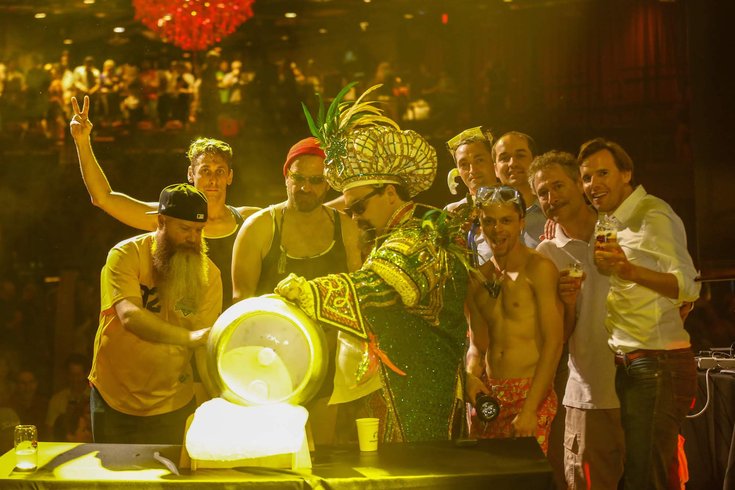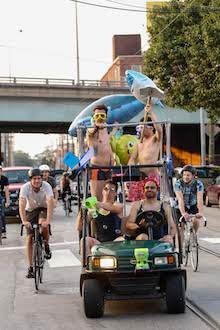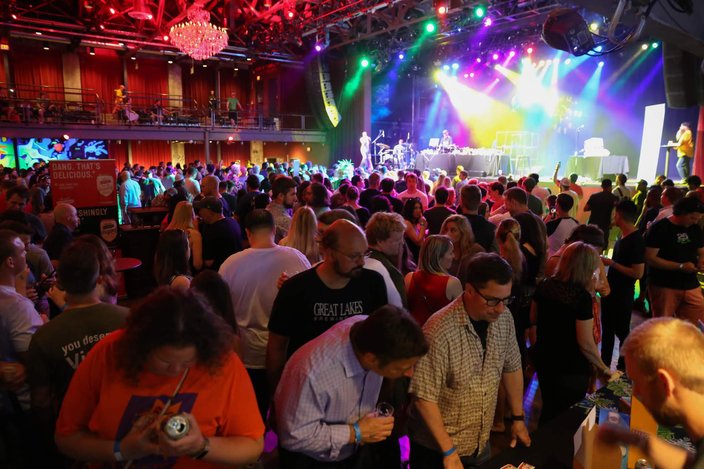
June 19, 2018
 Courtesy/Stephen Lyford
Courtesy/Stephen Lyford
Philly Loves Beer president Casey Parker (center, wearing Jason Kelce's Mummers outfit) takes center stage at Philly Beer Week's Opening Tap event on June 1, 2018.
The tip from “a concerned beer drinker” arrived smack dab in the middle of this month’s Philly Beer Week. It was dire, angry and emblematic of what seems to be a never-ending beef within certain elements of the regional suds community.
“I wanted to drop you a little tip about the impending implosion of Philly Beer Week,” it read. “Philadelphia is the only city in the country that has a ‘Beer Week’ that does not focus on local beer and is not run by local breweries.
“It’s 2018, not 1999. Is the opportunity to try Allagash (from Maine) really a thing? Philly Loves Beer is embarrassing and I for one am looking forward to the mutiny. Philly Loves Beer has jumped the shark.”
Those words ran counter to the spirit of pictures and accounts of this year’s Beer Week, which ran for 10 days starting with the Opening Tap at the Fillmore on June 1.
We asked those involved in the annual event – from organizers past and present to local brewers – what they saw for the future, and what they made of criticisms that many of them heard (or made) countless times before.
They all grappled with one big question: How will Beer Week evolve at a time when there are substantially more local breweries than existed at the event’s creation 11 years ago?
In November 2016, “Philly Beer Week” rebranded as “Philly Loves Beer" to represent its overarching presence. The move was designed to help it grow beyond an event-focused title into a year-round effort to promote local beers, among other things.
When we spoke recently, Casey Parker – the president of Philly Loves Beer – was still exhausted from what he deemed an “incredible” event that saw the diehard Eagles fan wearing Jason Kelce’s Mummers outfit for the Opening Tap gathering.
His first reaction was an audible sigh.
“I’ve been fighting this argument for so long now,” he said, conceding that recent years hadn’t featured the same energy as the early years, but he’s sensed a positive change of late. “I think this year’s was one of the best ever, and I was worried that it wouldn’t be. The excitement surrounding it was incredible.”
Having been part of it for more than a decade, he said the whole purpose of the branding shift was to “do a better job of (local-brewery) inclusion.”
The notion of competition always took a backseat to collaboration and celebration, he maintained.
Parker dismissed complaints about local inclusion as misguided, noting that he’d been to no fewer than three events during this year's Beer Week that featured “nothing but local beers. We’re taking local to a whole other level.”
"We would be doing ourselves a disservice if we only did local breweries." – Casey Parker
Yes, there was an “odd level of fatigue,” but that’s since disappeared, he said.
“We’re never going to serve crap,” he said. “We’re always going to support local breweries, but we’re never going to force all the lines to be all local because that’s not what ‘Philly beer’ is. I’m always skeptical when a brewery all of a sudden drops into our market, wondering whether they’re trying to raise their profile and sell out to a microbrewery.
“I don’t think bringing Alchemist's Heady Topper in (for Beer Week) is a bad thing. We would be doing ourselves a disservice if we only did local breweries.”
 Courtesy/Stephen Lyford
Courtesy/Stephen LyfordScenes from Philly Beer Week's 'Hammer of Glory' relay.
“If it’s good, we’ll pour your beer all year long. How is that non-inclusive?” he said of the expansion beyond a 10-day celebration.
“I’m just tired of arguing because a lot of the arguments are dumb arguments," he continued. “Our mission is to promote Philadelphia and the craft-beer scene and continue to grow it. The way it will be successful in the future is by having people talk about Philly Loves Beer and, oh yeah, we have this crowning 10-day festival in June.”
That’s not to say there won’t be challenges, of course.
Mike “Scoats” Scotese first brought craft beer to the market at Northeast Philly’s Grey Lodge Pub. He now runs Hop Angel Brauhaus, Sawtown Tavern and Bonk’s Bar. He’s the type of guy who’s attuned to local-brew intricacies.
Scotese agreed with Parker about the event always including a lot of local breweries.
"This year was no different,” he said, noting that the business’s evolution has had an impact over the course of more than a decade.
He stepped back and spoke about the challenges inherent in the shifting marketplace from a bar-owner's perspective.
Substantially more breweries in the region mean substantially more tasting rooms connected to those businesses. Fans of those beers are more likely to head to the brewery instead of a bar.
“You can’t make a living selling the same beer that the local brewery is selling. There’s so much out there. Victory (Brewing) has about 100 new ones a year, and that’s just one brewery,” he said. “There’s so much beer that nobody even cares anymore.”
“It used to be rare, a big deal, when a brewery released a new beer. Now, it’s available on supermarket shelves." – Mike 'Scoats' Scotese
By that, he meant that there are more beer events with each passing year. Social media gets word out to fans of a particular beer quickly.
“People feel they can stay home and that there will be another event tomorrow because beer is everywhere,” he said. “It used to be rare, a big deal, when a brewery released a new beer. Now, it’s available on supermarket shelves.
"You don’t need to go to a craft beer bar to get it. There’s so much going on that it’s harder to get a foothold.”
He cautioned that he’s not trying to sound negative about the evolution, but that many bars are now in a position that they have to rely on their restaurant side for financial success.
He also noted that Philly Beer Week “has the misfortune of succeeding beyond our wildest expectations." Still, that's not necessarily an overtly bad thing.
“I don’t think it’s going away,” he said. “We needed to change and that’s what the year-long mission could do.
"It’s a nice problem to have if you’re on the consumer side, but if you’re one of the pioneers, you wonder whether the world’s passing you by. How do you stand out from the pack?”
Speaking of Victory, co-founder and brewmaster Bill Covaleski takes pride in the volume of new brews that his company brews annually. ("If you can't go big, go home," he said on the phone from a family vacation on Monday morning.)
Still, he's of the mind that Beer Week should highlight local breweries as events like this were "about the city they take place at." That said, collaborations with outside breweries "make it more exciting."
To Covaleski, there's a trickle-down angle. Rather than it being an overarching philosophy, retailers, taverns and bars should host the sorts of events they want to host, whether that be all local, collaboration or otherwise.
"I've never been a proponent of controlling the experience and what retailers do," he said. "In essence, you're already seeing that ideal embraced with the name change from 'Philly Beer Week' to 'Philly Loves Beer.' They've already taken their hands off the wheel."
To hear a trio of local brewers tell it, they’re not all that concerned about the inclusion of beers from outside the region in the festivities, either.
“I’m not sure why anyone would care who’s involved,” said Tim Gill of Wissahickon Brewing Co. which officially opened in Philadelphia’s East Falls neighborhood in April 2017. “Who gives a s***? Good beer is good beer.”
"There’s no downside to being part of it." – Tim Gill, Wissahickon Brewing Co.
Sure, they can get overshadowed by bigger breweries with marketing budgets, but Gill maintained that wrinkle stands separate from what Philly Beer Week can do for operations the size of Wissahickon.
To Gill, it’s a collection of small events that brings the beer community together, helping breweries connect with their fan bases, and attracting “new fans.”
He said Wissahickon got a nice bump from being involved with a few Beer Week events earlier this month.
 Courtesy/Stephen Lyford
Courtesy/Stephen LyfordDespite complaints of an event potentially having run its course, an estimated 1,100 people attended Philly Beer Week's Opening Tap event at the Filmore on June 1, 2018.
“We would not have had those opportunities without Beer Week,” he said. “It helps us put a face to our products. Regardless of how big it is, it will boost craft beer awareness and help get everyone rowing the boat in the same direction. There’s no downside to being part of it."
In a similar situation was Sean Arsenault of South Philly’s Brewery Ars which he and his brother opened on Passyunk Avenue less than two years ago.
“As an outsider looking in, I thought there were too many non-local events. When we started, that only made sense if locals were involved in it year-round,” he said. “A lot of our events (this year) were the locals-only events. Bars that support locals, we did those, and now we have relationships with them.”
Tim Patton of Saint Benjamin Brewing Company in Kensington said he’s always appreciated Philadelphia’s ability to draw top-notch brews from out of town.
He deemed it an “amazing beer-importing city,” which can lead to “lockout,” meaning fewer spaces on taps at Philadelphia’s bars, he said.
“A lot of people are trying to figure out how the scene is shifting with local brewers,” said Patton, who sits on the Philly Loves Beer board. “My ideal vision would be to embrace the fact that, in 10 years, the scene is really different, becoming more craft beer centric and that’s exciting.”
Looking in from the outside this year was Don Russell, aka Joe Sixpack, who formerly helmed the event but who said he left “on my own accord” after a “disagreement over the direction it was taking” several years back.
He kept a positive tact going during a recent interview at Dawson Street Pub in Manayunk, but the conversation kept coming back to an evolving market and a difficulty getting word out about the events.
"The energy behind it is still strong, but it's much smaller today," he said. "It's a shame. This was the first (beer fest) in the nation."
Saying he didn't really hear much buzz about the event before it started this year, he rued the fact that his vision didn't come to fruition. He also mulled whether Philly Beer Week has “already served its purpose.”
“I always felt it could be much bigger than it is,” he said, alluding to financial constraints that both he, and the current board, acknowledged (albeit for different reasons).
Though the current board is confident it can, Russell questioned whether the “year-round presence” could be accomplished despite those budget constraints. There are some philosophical contradictions as well.
“I always thought Opening Tap should be used to show off Philadelphia breweries. We wanted to show off our local beers,” he said. “I was always in favor of being inclusive, with Philly beers promoted first.”
Ironically, both the old and new guard are both branching out onto the web to help bolster local beers in the Philadelphia market.
The Philly Loves Beer website is being utilized as a promotional tool considerably more effective than the previous site. It's the group's way of overcoming promotional issues brought on by a waning print-media industry.
For his part, Russell waited until Philly Beer Week ended to launch his website centered on local brews: Philly Beer World. He sees it as a way to, with ad sales, bolster local coverage of the beer world at a time when he thinks it's lacking. He also hopes it can help bolster Philadelphia as a "beer tourism destination."
Whether the sites will turn into rivals remains to be seen. Heck, that may not even be the purpose, considering everyone involved has increased awareness about beer in the market as their driving force.
The Philly Loves Beer board is meeting Tuesday to reflect on the Beer Week's successes and lessons, at which point they'll crunch numbers regarding attendance and impact.
The group's executive director, Christina Dowd, offered up some anecdotal evidence that backed Parker's take on the event.
“I went to four to seven events every day," she said, "and I never walked into any sort of empty room."
Those who love Philly Loves Beer hope that's a common refrain for years to come, putting anonymous whispers of its demise to rest.